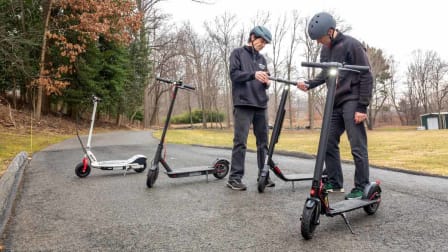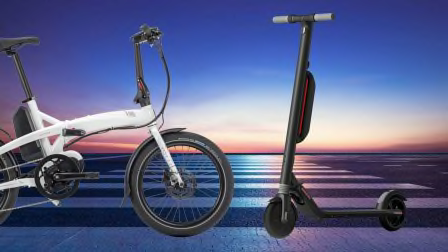Avoid Coronavirus While Riding a Rented Bike or Electric Scooter
Follow the advice from ride-share companies if you're looking for an alternative to public transportation

Update: This week, e-scooter startup Lime announced it was temporarily suspending operations in countries across the world, including the U.S., because of the cornavirus, and its main competitor, Bird, said it was pausing operations in some U.S. cities. But other e-scooter rental apps and bike-share programs may continue operating in some cities. The precautions described below will still apply to them.
More cities across the U.S. have announced measures in recent days to limit the movement of people as a way to combat the spread of COVID-19: from school districts temporarily closing to restaurants being open only for take-out or delivery.
If you live in a city, you might also be taking steps to avoid public transportation, where large groups of people can congregate. Indeed, in New York City, subway ridership has drastically fallen in recent days as fears of the novel coronavirus have spread.
What Companies Are Doing
CR reached out to Bird and Lime to see what the companies are doing to allay concerns from riders who might worry about catching the coronavirus on an e-scooter.
Travis VanderZanden, founder and CEO of Bird, said in a statement that the company is increasing how frequently it cleans and sanitizes vehicles in the field each day. It’s also increasing what VanderZanden described as “deep-clean” vehicle baths that take place at local service centers.
Workers in the field will be provided extra gloves and hand sanitizer, he said, and the company is continuously monitoring statements from the Centers for Disease Control and Prevention and the World Health Organization for updates. Policies and operations will be updated as more is learned about COVID-19, he added.
“At Bird, we remain fully focused on the health and safety of the communities in which we live, work, and operate,” he said.
Nick Shapiro, global head of trust and safety at Lime, wrote in a blog post last week that Lime has also increased the frequency of cleaning and disinfecting scooters, while mechanics and operators in the field have been required to wear gloves and wash their hands regularly.
Lime is also following developments from the CDC, WHO, and other health organizations, he said, and, “Based on this information, we will decide to continue, pause, or suspend operations in certain markets.”
Some cities with bike-share programs are also taking extra steps amid the coronavirus outbreak, like Pittsburgh's Healthy Ride system. Last week, Healthy Ride issued a statement relevant to bike-share riders anywhere, such as: washing your hands before and after a ride (or using hand sanitizer with at least 60 percent alcohol); avoid touching your eyes, nose or mouth; and consider wearing gloves while riding.
"During this time, we anticipate an increase in ridership as people seek transit alternatives that do not require close physical contact," the Healthy Ride statement said, citing recommendations from health officials to observe social distancing. "Our team is currently taking steps to sanitize our fleet of bicycles—however, it is still recommended that our customers wash their hands after each use."
What You Should Do
Shapiro’s statement also provided advice for riders using a rented scooter, but his points are just as relevant to anyone with a privately owned scooter. Shapiro said that you should:
• Wipe down scooter handlebars with a disinfectant prior to riding.
• Consider wearing gloves and washing your hands before and after riding.
That advice echoes what CR heard recently from David Freedman, M.D., a professor of infectious diseases at the University of Alabama at Birmingham.
“The virus is not going to jump off the handlebars and jump into your mouth,” Freedman said. Instead, he said, cleaning your hands after touching the handlebars is probably the best way to stay safe.


